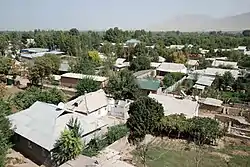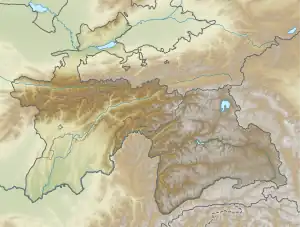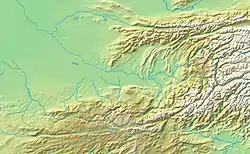Qubodiyon
Кабодиён/Қубодиён | |
|---|---|
 | |
 Qubodiyon Location in Tajikistan  Qubodiyon Qubodiyon (Tokharistan) | |
| Coordinates: 37°24′27″N 68°11′06″E / 37.40750°N 68.18500°E | |
| Country | |
| Region | Khatlon |
| District | Qubodiyon District |
Qubodiyon, also Qubadiyan, ancient Kobadiyan (Russian: Кабодиён; Tajik: Қубодиён, Persian: قبادیان Qobādiyān) is a town in the Khatlon Region of Tajikistan. It is the capital of Qubodiyon District. The population of the town is 12,200 (January 2020 estimate).[1]
Qubodiyon was possibly founded by the Sasanian king Kavad I (r. 488–496, 498/9–531) during his exile in the Hephthalite Empire, where the town possibly served as his source of revenue.[2] In the early medieval period, it was capital of the district of Kubadhiyan.
Nasir Khusraw, a Persian poet,[3][4] philosopher, Isma'ili scholar, traveler and one of the greatest writers in Persian literature was born in the village in 1004 CE.
The Oxus Treasure was found near Kobadiyan.[5]
 Kabadiyan ambassador to the Chinese court of Emperor Yuan of Liang in his capital Jingzhou in 516–520 CE, with explanatory text. Portraits of Periodical Offering of Liang, 11th century Song copy. The ambassador accompanied the Hephthalites to China.
Kabadiyan ambassador to the Chinese court of Emperor Yuan of Liang in his capital Jingzhou in 516–520 CE, with explanatory text. Portraits of Periodical Offering of Liang, 11th century Song copy. The ambassador accompanied the Hephthalites to China.
References
- ↑ "Population of the Republic of Tajikistan as of 1 January 2020" (PDF) (in Russian). Statistics office of Tajikistan. Retrieved 9 October 2020.
- ↑ Rezakhani 2017, p. 133 (note 23).
- ↑ Christides, V. (1993). "Milaha". In Bosworth, C. E.; van Donzel, E.; Heinrichs, W. P. & Pellat, Ch. (eds.). Encyclopaedia of Islam. Volume VII: Mif–Naz (2nd ed.). Leiden: E. J. Brill. p. 43. ISBN 978-90-04-09419-2.
- ↑ Nanji, Azim (1993). "Nasir-i Khusraw". In Bosworth, C. E.; van Donzel, E.; Heinrichs, W. P. & Pellat, Ch. (eds.). Encyclopaedia of Islam. Volume VII: Mif–Naz (2nd ed.). Leiden: E. J. Brill. p. 1006. ISBN 978-90-04-09419-2.
- ↑ "East of Termez, on the Kafirnigan River, on the territory of Tajikistan, lies the small town of Kobadiyan, near which was found in the late 1870s one of the most famous treasures of all time, the so - called treasure of Oxus." in Knobloch, Edgar (2001). Monuments of Central Asia: A Guide to the Archaeology, Art and Architecture of Turkestan. Bloomsbury Academic. p. 150. ISBN 978-1-86064-590-7.
Sources
- Rezakhani, Khodadad (2017). ReOrienting the Sasanians: East Iran in Late Antiquity. Edinburgh University Press. pp. 1–256. ISBN 9781474400305.
External links
 Media related to Qabodiyon at Wikimedia Commons
Media related to Qabodiyon at Wikimedia Commons
This article is issued from Wikipedia. The text is licensed under Creative Commons - Attribution - Sharealike. Additional terms may apply for the media files.
